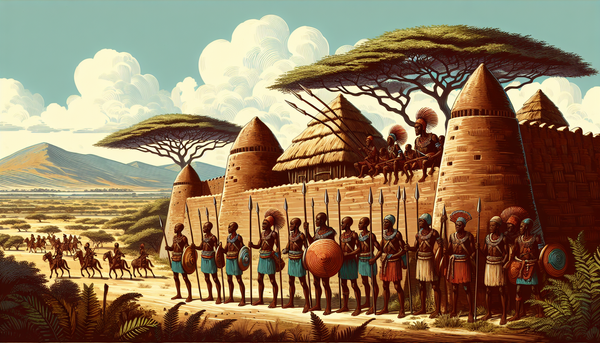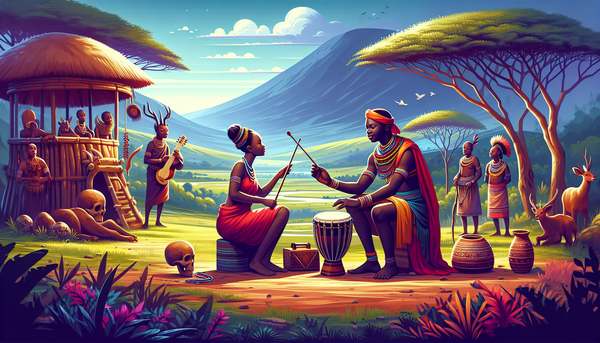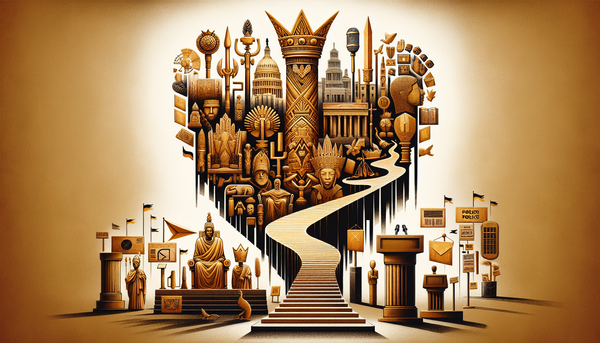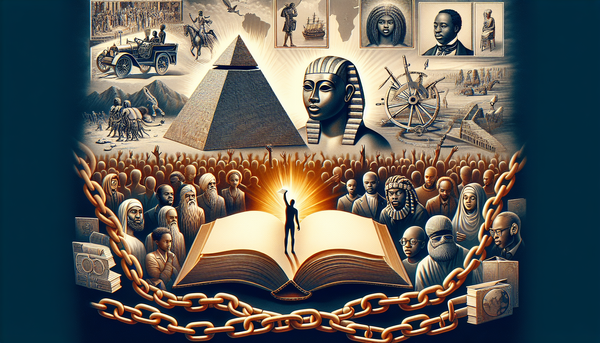The Contributions of African Philosophers to Modern Thought

Exploring the Influence of Ancient Egyptian Philosophy on Western Ideologies
Ancient Egyptian philosophy has subtly but significantly shaped Western thought through its profound exploration of ethics, metaphysics, and the nature of existence. The Egyptians grappled with fundamental questions about life, death, and the cosmos, contributing concepts that resonate within Western philosophical traditions. Central to Egyptian thought was the idea of Ma'at, a principle representing truth, balance, and cosmic order. This notion influenced later philosophical discussions on justice and morality, as seen in the works of Plato and Aristotle, who sought to define virtues that balance individual desires with societal good.
Moreover, Egyptian contributions to metaphysical inquiries, particularly concerning the afterlife and the soul, laid groundwork for later theological concepts in Judeo-Christian traditions. The Egyptian narrative of the soul's journey and the concept of judgment in the afterlife echo in Western religious philosophies, emphasizing accountability and moral living.
Additionally, the symmetry of Egyptian art and architecture reflects an epistemological approach that prioritizes order and harmony, ideals that continue to permeate Western aesthetics and philosophical discourse. Thus, Ancient Egyptian philosophy serves as a critical yet often understated precursor that enriched the evolution of Western ideology, providing timeless insights into humanity's most essential inquiries.
The Impact of Ethiopian Philosophical Traditions on Religious Discourses
Ethiopian philosophical traditions have made substantial contributions to religious discourses, particularly through their unique interpretations of spirituality, ethics, and community. Rooted in ancient texts such as the Kebra Nagast, Ethiopian philosophy emphasizes the importance of divine justice and moral responsibility, fostering a rich narrative around the relationship between humanity and the divine. This tradition has significantly influenced interpretations of Christianity and its integration into local cultural practices.
Ethiopia is known for its distinct brand of Christianity, which incorporates elements of indigenous belief systems and philosophical reasoning. Ethiopian theologians, such as Saint Athanasius and Saint Gregory of Nyssa, contributed to early Christian thought, emphasizing the importance of the Trinity and the incarnation of Christ. Their works articulate how divine mysteries are understood through an Ethiopian lens, encouraging dialogue that respects cultural context.
Moreover, the notion of “ubuntu” in Ethiopian thought—the interconnectedness of all beings—resonates deeply within global ethical discussions on community and interdependence. This holistic approach fosters inclusivity and unity, enriching contemporary religious and philosophical debates. Therefore, Ethiopian philosophical traditions offer profound insights that not only shape local religious practices but also resonate with broader universal themes, influencing interfaith dialogues worldwide.
Moral and Ethical Insights from West African Yoruba Philosophy
West African Yoruba philosophy presents a rich tapestry of moral and ethical insights that have profoundly influenced both local and global perspectives. Central to Yoruba thought is the concept of "Iwa," which translates to character or ethical disposition. Iwa emphasizes the importance of living a life aligned with virtues such as honesty, integrity, and communal responsibility. This principle underscores the Yoruba belief that an individual's moral character directly impacts their community and harmony within society.
Another pivotal element is the concept of "Ori," representing one's inner spirit or consciousness. The Yoruba assert that nurturing one's Ori leads to personal fulfillment and ethical living. Decisions are weighed not solely based on individual desires but based on how they affect the community and the greater good. This collectivist viewpoint fosters a sense of shared responsibility and accountability.
Yoruba philosophy also embraces the interconnection between humans and the divine, emphasizing the influence of spiritual forces on ethical behavior. The interplay of spirituality and morality cultivates a holistic approach to ethics, encouraging individuals to consider spiritual implications in their actions.
Overall, the moral framework provided by Yoruba philosophy offers valuable insights into ethical decision-making, emphasizing community, character, and spiritual alignment as fundamental guiding principles.
Contributions of North African Thinkers in the Development of Islamic Philosophy
North African thinkers have played a pivotal role in shaping Islamic philosophy, contributing significantly to its development during the medieval period and beyond. Scholars such as Al-Farabi, Ibn Rushd (Averroes), and Ibn Khaldun exemplify the rich intellectual heritage of the region, weaving together Islamic teachings with Greek philosophical traditions.
Al-Farabi, often referred to as the "Second Teacher" after Aristotle, made substantial strides in political philosophy and ethics. His works emphasized the necessity of a virtuous ruler and a just society, blending Aristotelian logic with Islamic thought. This synthesis influenced later philosophers and political theorists, shaping the discourse on governance in the Muslim world.
Ibn Rushd further bridges the gap between Greek philosophy and Islamic theology. Known for his commentaries on Aristotle, he defended the compatibility of reason and faith, arguing that philosophical inquiry could enhance religious understanding. His ideas not only impacted Islamic thought but also reverberated through the Renaissance in Europe.
Ibn Khaldun, the father of sociology and historiography, introduced innovative concepts regarding social cohesion, state formation, and the dynamics of civilization. His seminal work, the Muqaddimah, provides insights that remain relevant in contemporary discussions on society and governance. Through these thinkers, North Africa has profoundly influenced the evolution of Islamic philosophy and its intersection with broader intellectual currents.
The Role of South African Philosophers in Anti-Colonial Movements
South African philosophers played a crucial role in the country’s anti-colonial movements, providing intellectual frameworks that challenged oppression and inspired resistance. Key figures like Nelson Mandela, Steve Biko, andOB. Sesanti focused on the intersection of philosophy, politics, and identity, laying the groundwork for liberation ideologies that would resonate throughout the continent.
Nelson Mandela's writings reflect his deep understanding of justice, equality, and freedom. His commitment to non-violent resistance and his belief in reconciliation demonstrated an ethical approach rooted in Ubuntu—a philosophy emphasizing communal relationships and compassion. This perspective not only united various factions in the anti-apartheid struggle but also influenced global civil rights movements.
Steve Biko championed black consciousness, advocating for the psychological liberation of Black South Africans through self-awareness and pride. Biko’s philosophical contributions emphasized the importance of identity and self-definition, empowering marginalized communities to challenge colonial narratives and seek their liberation.
Moreover, philosophers such as Frantz Fanon and Aime Cesaire, while not South African, found resonance in South African struggles, shaping the discourse of liberation across the continent. Overall, these thinkers provided philosophical insights that galvanized the anti-colonial efforts, making significant contributions to the theoretical foundations of resistance and liberation in South Africa.
Madagascar’s Philosophical Contributions to Environmental Ethics
Madagascar’s unique ecological diversity, coupled with its rich cultural heritage, has fostered distinctive philosophical contributions to environmental ethics. Central to Malagasy thought is the concept of "Biodiversity and Interdependence," which reflects a deep-rooted understanding of the interconnectedness between humans and nature. This philosophy emphasizes that the health of ecosystems is intrinsically tied to the well-being of communities, promoting a holistic view that encourages ecological stewardship.
Traditional Malagasy beliefs often incorporate the notion of "Fihavanana," which denotes harmony and kinship among people and the environment. This principle stresses the importance of relationships with ancestral lands, flora, and fauna, advocating for sustainable practices that have been passed down through generations. The cultural practice of "Tavy," or slash-and-burn agriculture, embodies this philosophy, as it highlights the balance between agricultural needs and ecological preservation.
Moreover, contemporary Malagasy philosophers and environmental activists advocate for the protection of the island's unique biodiversity, recognizing its global significance. They emphasize the ethical responsibility to preserve endangered species and habitats, arguing that environmental degradation ultimately threatens cultural identity and heritage.
In summary, Madagascar’s philosophical contributions to environmental ethics underscore a profound relationship with nature, promoting sustainability and responsibility that align cultural values with ecological imperatives, offering valuable insights for global environmental discourse.
Central African Contributions to the Philosophy of Language and Semantics
Central African thinkers have made significant contributions to the philosophy of language and semantics, enriching global discourse with unique perspectives rooted in local cultures and oral traditions. The region’s diverse linguistic landscape, featuring numerous languages and dialects, has fostered a deep appreciation for the nuances of communication and meaning.
One prominent area of study has been the relationship between language and identity. Scholars such as Ngugi wa Thiong'o emphasize the importance of language in constructing cultural narratives and self-understanding. By advocating for the use of indigenous languages in education and literature, they argue that language serves not only as a tool for communication but also as a vessel for cultural heritage and expression.
Additionally, the oral traditions of Central Africa, characterized by storytelling and proverbs, have highlighted the performative aspects of language. Thinkers from the region explore how narratives convey complex philosophical ideas, ethical teachings, and communal values, demonstrating that language is deeply intertwined with social contexts and cultural practices.
Furthermore, discussions surrounding the semantics of proverbs and idiomatic expressions reveal the rich layers of meaning inherent in Central African languages, showcasing how semantics can be understood through lived experiences and communal wisdom. Overall, Central African contributions to the philosophy of language underscore the vital interplay between language, culture, and identity.



